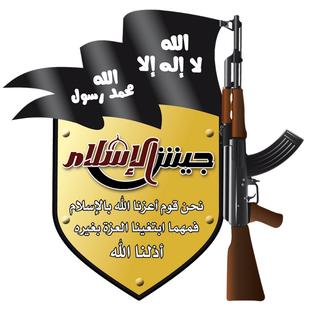Washington Kurdish Institute
Feb 9, 2016
Jaysh al-Islam (Army of Islam) was formed through the merger of several organizations, and many of its members were previously members of the Islamic State (ISIL), the al-Nusra Front (al-Qaida’s affiliate in Syria) or Ahrar Al-Sham (Islamic Movement of the Free Men of the Levant), all radical groups designated as terrorist organizations by various governments.
Jaysh al-Islam was founded by Zahran Alloush, who was killed in an airstrike in Rif Damashq (the Countryside of Damascus) on December 25, 2015 while meeting with leaders of Ahrar Al-Sham and the al-Nusra Front along with other Islamic groups in Syria. Alloush was married to three women and was the son of Shekh Abdullah Alloush, a preacher who was considered an authority by Salafists in Damascus. Zahran Alloush began missionary activities after completing a masters in Islamic Shari’a law in Saudi Arabia, and was soon targeted by the Assad regime. Surprisingly, after only two years in the Sednaya Prison on weapons charges, he was released during a general amnesty along with about 1,500 other Salafists.
Freed just three months after the onset of the Syrians’ protests against the regime, Alloush and hundreds of other Salafists and jihadists helped convert the revolution, which caught the regime off guard, into a violent armed conflict, eliminating the dreams of Syrian people. The release of a large number of Salafists, including Alloush, was on done by the Assad regime to help justify attacks on protestors and convince international community that Assad’s forces are fighting extremist groups. Assad also persecuted the Syrian Youth Union elements who initiated the peaceful protests against the regime using the same pretext. Alloush first establised a armed force, the Squad of Islam, which then it was expanded to form Liwa al-Islam (Brigade of Islam) until September 2013, when he announced the formation of Jaysh al-Islam(Army of Islam), which included 45 Free Syrian Army (FSA) groups along with members of the al-Nusra Front and Ahrar Al Sham.
Alloush was accused of being responsible for disappearance of civil society activists, including, most prominently, the abduction of human rights activist Razan Zaitouneh and her colleagues. Alloush spoke out against advocates of democracy, stating, “Democracy leads to the separation of people.” He was also accused of multiple human rights violations including the execution of dozens of civilians in the city of Adra al-Omaliyah and the forcible use of civilians as human shields to prevent the regime’s planes targeting his fighters in the city of Douma.
Alloush embraced hardline Salafist jihadist ideology and called for creation of a radical Islamic state. He opposed republican or democratic models, and, according to his speeches, called for the establishment of an Islamic caliphate state, modelled on the Umayyad Caliphate rather than the Rashidun Caliphate.
On December 25, 2015, the Syrian Observatory for Human Rights (SOHR) announced the killing of Zahran Alloush along with several other members of Jaysh al-Islam in an airstrike in the al-Marj neighborhood of Ghouta, Damascus. It was not confirmed whether this airstrike was executed by Russian or Syrian regime forces, and some sources stated that Alloush was killed the day before while meeting other leaders from his group and planning on attacks against Hizbullah between Ghouta, Douma, and Saqba. Zahran Alloush had excellent relations with the al-Nusra Front and said in one interview that he recognized their “jihad.”
Jaysh al-Islam became powerful and was supported by Saudi Arabia, Turkey, and Ayman al-Zawahiri, the head of al-Qaida. The Syrian Ba’athist regime destroyed the majority of the Rif Damashq province, causing many of the people of the area to empathize with group and helping increase its popularity. If it was not for the brutality of the Syrian regime against the people of Rif Damashq, Jaysh al- Islam would never have gained such support in the area. After gaining ground, the group suffered from paranoia and began to terrorize the local people, sometimes to an even greater extent than the regime did. On several occasions, Jaysh al-Islam struck against civilians using Grad rockets, gas cylinders, and mortars, causing deaths and injuries, especially in the town of Ghouta where the group hid stores of food and prevented their distribution, prompting several demonstrations. Alloush’s ambitions were not limited to controlling his own group – he tried to persuade other opposition groups to join the his group and in some cases fought other factions, as with Jaysh al-Ummah (Army of the Nation), where Alloush’s fighters detained the head of the group, Ahmad Taha, and killed several of its members.
Today, Jaysh al-Islam is considered as ideologically extreme as ISIL and the al-Nusra Front, with significant military power. In April 2015, the group conducted a military parade after Alloush’s visit to Saudi Arabia which included thousands of fighters as well as tanks and other military equipment.
After the death of Alloush, Issam al-Boudani was named head of Jaysh al-Islam, though Alloush’s brother Mohammad is a member of the political leadership of the group and was named as a negotiator for the Syrian opposition at the Geneva 3 conference on Syria. Without a doubt, Jaysh al-Islam is one of the major extremist groups in Syria that is leading the Syrian people further into ruin, while the people of Rif Damashq remain stuck between the Assad regime’s forces on one side and Jaysh al-Islam on the other.
Disclaimer: The views, opinions, and positions expressed by authors and contributes do not necessary reflect those on the WKI.




